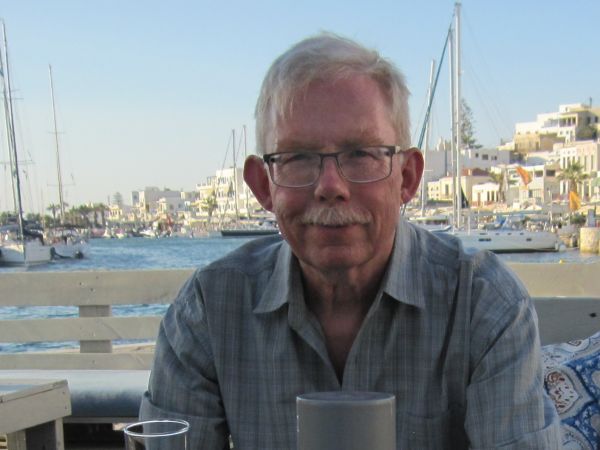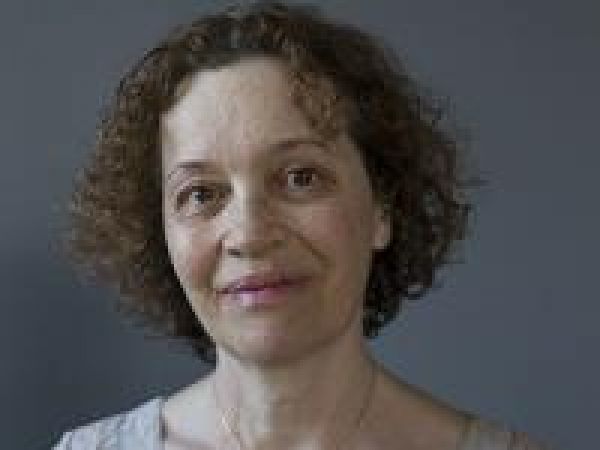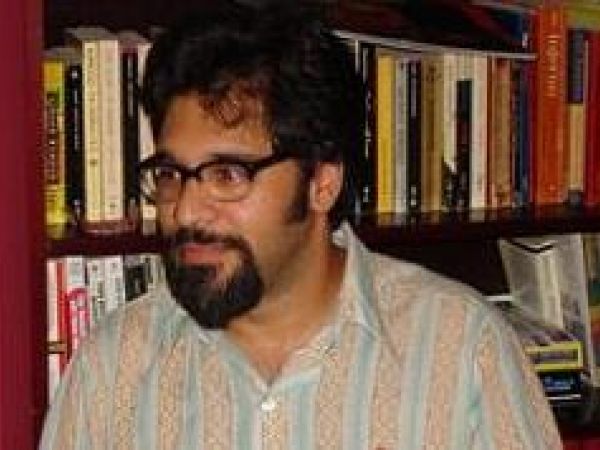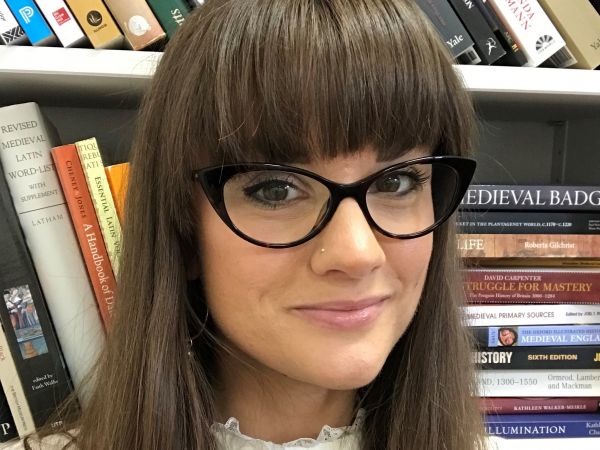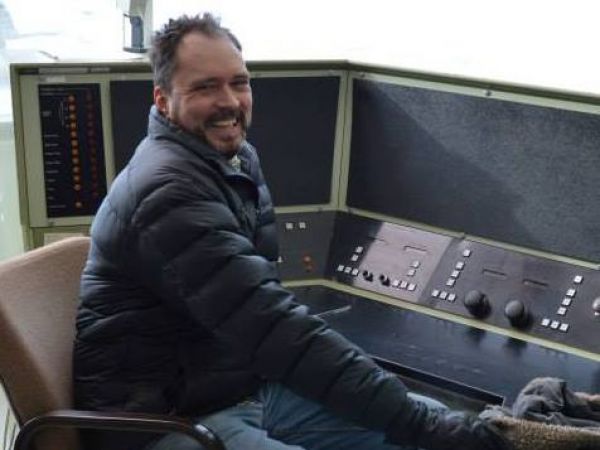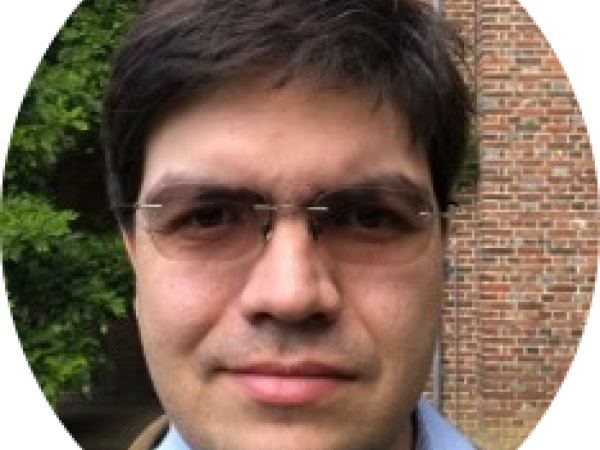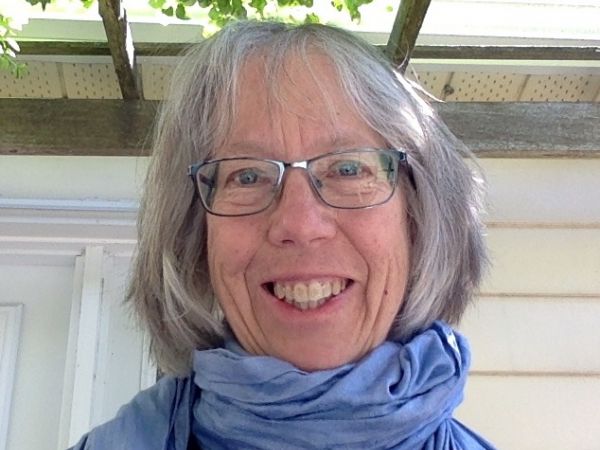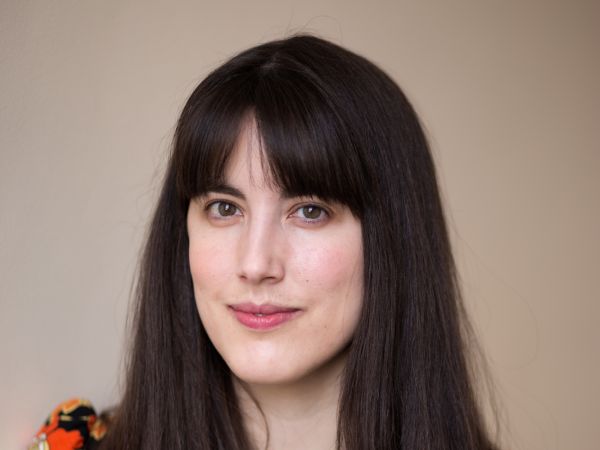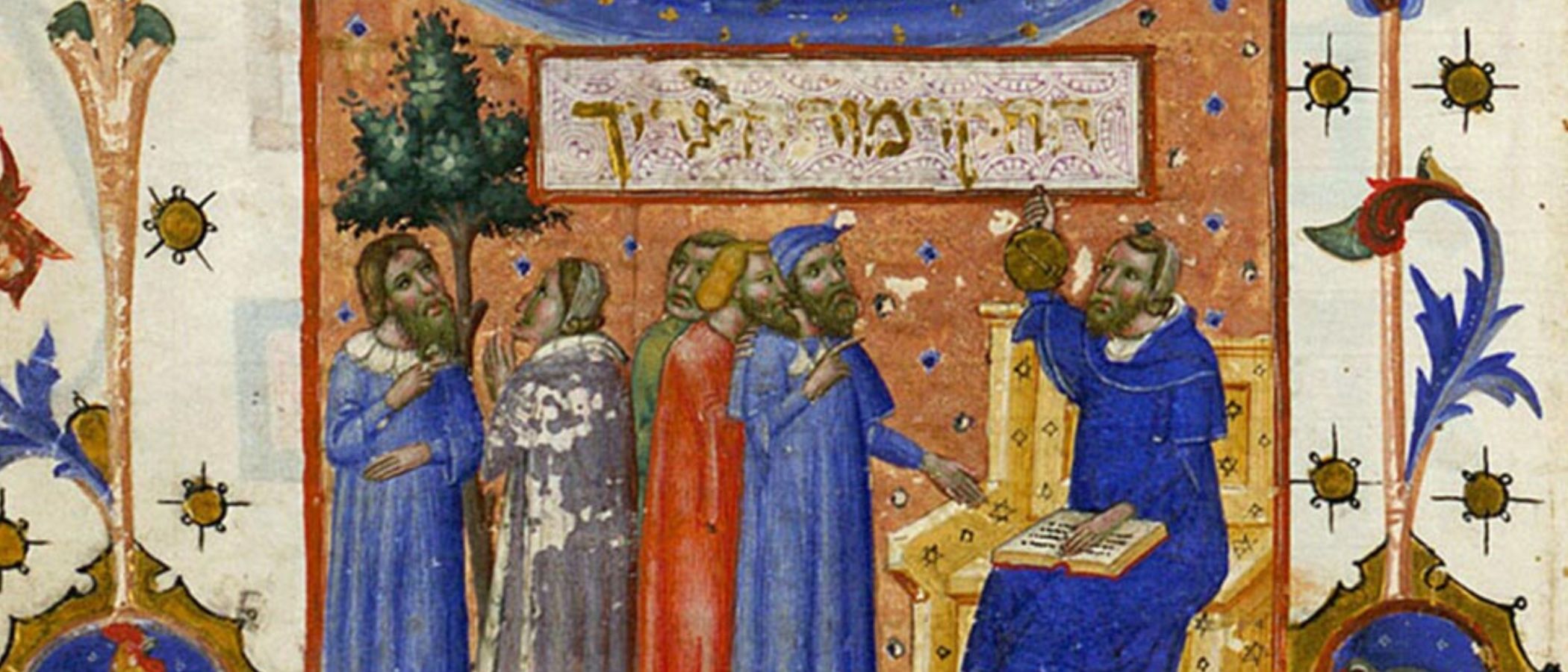
Courses
Undergraduate and graduate courses in Medieval Studies are offered by a variety of departments at Queen's.
Availability changes year to year. For current course offerings, consult the applicable Department's website or check SOLUS.
ARTH 100: Art in the West from Antiquity to Modernity
A survey of famous and lesser-known works of painting, sculpture, architecture, and other art forms from Antiquity, the Middle Ages, the Renaissance, the Baroque, and the Modern Age. Themes include politics, religion, mythology, gender roles, techniques, conservation and intersections with non-western cultures.
ARTH 208: Caves, Cathedrals, Capitals: Introduction to World Architecture
Covering considerable territory, from the painted caves of Niaux in South-West France to megalithic monuments such as Stonehenge, from the villages of the Middle Ages to the cities of Modernity, this course introduces key ideas, monuments, building technologies and protagonists in the history of Architecture from prehistory to present.
ARTH 212: Medieval Art
An introduction to the arts of the Middle Ages (c.300-1400) from the origins of Christian art under the Emperor Constantine, through the Early Christian, Byzantine, Romanesque and Gothic Periods. The focus will be on major monuments and personalities.
ARTH 307: Romanesque: Art and Historicism in Europe c. 800-1150
This course considers the retrospective tendencies in art of the so-called ‘Romanesque period’ leading up to the ‘Gothic’. Considering monuments across all media, we discuss concepts of artistic development in cathedral, monastic and secular settings. We will also consider modes of ‘reading’ and interpretation of medieval art in terms of contemporary modes of perception.
ARTH 308: Gothic Art in Europe c. 1150-1400
This course examines the changes in European art later known as ‘Gothic’. With a focus on England, France, Spain, Italy and Germany, this class will consider major monuments across the media, from manuscript painting to architecture, stained glass, sculpture and ars sacra. Throughout, monuments will be placed in their appropriate social, historical and patronal contexts.
ARTH 415: Topics in Medieval Art History
A detailed study of one area or topic in the history of medieval European art.
ARTH 482: Gothic Sculpture
A study of the evolution of Gothic sculpture from the mid-12th century to the 15th century. Topics will range from the elaborate sculptural programs of great cathedrals to the work of Claus Sluter and other major sculptors of the late Middle Ages.
LATN 110: Introductory Latin
Fundamentals of grammar, syntax and etymology for students with no or little knowledge of Latin; provides sufficient background to read Latin prose and poetry.
LATN 209: Intermediate Latin
Review of grammar followed by a study of representative works of Ovid and other authors. In addition to developing facility in translation, study of literary content and background of authors.
DRAM 273: Medieval Drama Performance
Bader International Study Centre; Not offered in 2022-23
A practical performance course where students will actively explore historical performance styles and conventions. The focus of this course will be the rehearsal of one or more plays to be presented in period acting style and costume as part of England's Medieval Fair at the culmination of the course. Offered as part of the BISC Field School in Medieval Performance Studies.
ENGL 281: King Arthur: Medieval to Modern
Arts and Science Online, Instructor TBD, Fall 2022
This course investigates the enduring popularity of the legend of Arthur, with an emphasis on its adaptability to the changing values and viewpoints of different cultural moments (Celtic, Medieval, Victorian, Modern). Themes to be investigated may include chivalry, courtly love, the grail quest, national identity, politics and gender relationships.
ENGL 290: Seminar in Literary Interpretation: Beowulf & Grendel
Ruth Wehlau, Fall 2022
Beowulf deals with themes of heroism, violence, and loss while relating the story of the hero’s life and his battles against three monsters. The course will involve close readings of Beowulf, paying special attention to the notion of the monster and the monstrous in the poem. The latter part of the course will deal with the novel Grendel by John Gardner, which makes Grendel into the hero of the story. We will also examine other re-workings of Beowulf in film or print, depending on class preferences. Beowulf will be read in a facing page translation, allowing the class to look at the original Old English while doing close readings of the poem.
ENGL 306: The Northern World: Vikings and Saxons
Ruth Wehlau, Fall/Winter 2022/23
This course will introduce students to the early literature of people from three major islands of northwest Europe — Iceland, Ireland, and Britain. The course will pay special attention to interaction among these peoples, both friendly and unfriendly, and to their perception of themselves and their North Sea neighbours as represented in their literature. Works to be read include sagas, myth, epic, tales, and lyrics from all three islands, including Beowulf, Icelandic sagas, and a variety of Welsh and Irish stories and poems. Classes will involve a combination of lecture and discussion.
ENGL 310: Medieval Literature of the British Isles
Not offered in 2022-23
A survey of vernacular literature composed in the British Isles before 1500. Readings may be taken from Welsh, Irish, Old English, Norman and Middle English literature and may include such works as The Mabinogion, the Lais of Marie de France, Beowulf, Sir Gawain and the Green Knight, and selections from Chaucer.
ENGL 311: Middle English Literature
Not offered in 2022-23
A study of the poetry, drama, and prose of late medieval Britain. Texts are read in Middle English; language training is provided. Readings may include the dramatic cycles, Arthurian romance, Chaucer and his successors, women's writing, spiritual writing, historiography, and the culture of political and religious dissent.
ENGL 312: Literatures and Cultures of the Medieval World
Not offered in 2022-23
This course introduces students to major pieces of medieval literature, their cultural contexts, and associated critical paradigms. Situating texts from England in an international context illuminates the dynamic literary exchange among England, Europe, and the Islamicate cultures of the Mediterranean.
ENGL 411: Topics in Medieval Literature I: Medieval Monsters
Ruth Wehlau, Winter 2023
Medieval literature is replete with monsters of all sorts, including giants, trolls, witches, werewolves, revenants and dragons. This class will examine a variety of works from various traditions which feature monstrous creatures or characters, including Beowulf, Grettir’s Saga, Sir Gawain and the Green Knight, and other romances and tales. Our analyses of these texts will engage with “monster theory” as delineated by Jeffrey Jerome Cohen and other critics as we investigate the following questions: What constitutes monstrosity? How do monsters draw cultural boundaries? Most works will be read in translation, but some Middle English romances will be read in the original Middle English. Students will receive guidance on reading Middle English.
ENGL 824: Topics in Medieval Literature: Popular Literature and Performance in the Middle Ages
Not offered in 2022-23
This course will investigate the popular literature of England as it was manifested in romance, lyric, drama, and ballad from the 14th through the 16th centuries. During the course, we will examine texts dealing with popular chivalric heroes such as Gawain, and outlaw heroes such as Robin Hood. Discussions will include the role of orality and performance in popular culture of the period, and of carnivalesque inversions of authority as found in popular festivals. As one goal of the course involves the role of oral performance in popular culture, students will be expected to prepare (but not memorize) a text (or part of a text) for performance.
ENGL 826: Medieval Gender and Sexuality
Margaret Aziza Pappano, Winter 2023
This course will explore medieval constructions of gender and sexuality, seeking to locate both continuities and discontinuities with modern conceptions and practices. While labels such as “gay,” “genderqueer,” “transgendered” did not exist in the Middle Ages, medieval people imagined and engaged in types of gender shifting and polymorphous modes of desire that help us to understand the necessity for labile terminology to describe identities linked with gendered and sexual practices. Examining traditions from Medieval Europe but with some exploration of the Islamic Middle East, this course considers how various aspects of medieval culture, such as religion, celibacy, knighthood, courtly culture, marriage, class hierarchy, crossdressing, etc. shaped notions of gender and sexuality. Though examining theological, medical, and legal writings, moral guidebooks, chronicles, artwork, and literary works, this course will engage texts from the early to late Middle Ages in dialogue with contemporary theoretical writing to attempt to articulate specificities of the medieval sex/gender system. Requirements include regular attendance and participation, oral presentation, research paper.
FREN 241: Histoire culturelle et littéraire de l'Ancien Régime
An introduction to French literature from the Middle Ages to the end of the Eighteenth Century stressing how tensions generated between different ideas within a period determine the aesthetic, philosophical, and literary choices made by major authors.
FREN 304: Introduction à la littérature française du Moyen Age
A study of representative literary works in the Middle Ages, including La Chanson de Roland, Tristan et Iseult, Le Roman de Renart, Le Roman de la Rose, Chrétien de Troyes, Rutebeuf and Villon.
HIST 215: Sport, Virtue, and the Spectacle of Violence from Antiquity to the Renaissance
Tony D'Elia, Winter 2024
Sports and spectacles of violence, from Ancient Greek athletic contests and Roman gladiatorial combat to jousts, hunts, executions, and mock battles of Medieval and Renaissance Europe. Exploring ruins of buildings, texts, and images illuminate such issues as gender roles, social and political functions of violence, eroticism, and animal cruelty.
HIST 218: Byzantium
Richard Greenfield, Winter 2024
The world of Byzantium – that of the ‘other’ Middle Ages of the Eastern Mediterranean – is a fabled and exotic one. If you’ve ever heard of Constantine or Justinian & Theodora, of Constantinople or Antioch, of Hagia Sophia or the Hippodrome, of the battle of Manzikert or the Fourth Crusade, of iconoclasts, monophysites or the schism of the churches, of eunuch courtiers or pillar saints, and if you’ve ever wondered who or what they really were, this is the course for you! This lecture will survey some of the most interesting and key aspects of Byzantine history, society and culture from the fourth to the fifteenth century. One aim of the course will be to familiarize students with the general shape of the political history of the Byzantine state during the nine hundred years from its foundation in Late Antiquity as the successor of Rome down to its final crippling and ultimately fatal encounters with the crusading powers of Western Medieval Europe and the emerging Ottoman Turks. The lectures also aim, through a series of snapshots of vital topics, to provide a broad understanding of some of the most important features of Byzantine society, culture, and belief as well as its complex identity. It will also attempt to give some sense of Byzantium’s place in the world – its relations with and attitudes towards the numerous and diverse peoples, powers, and religions of the regions that surrounded it. In doing so it will encourage broad interest in Medieval, Middle Eastern and Mediterranean studies while being of particular interest to students of the Roman Empire, the Middle Ages, the Eastern Mediterranean, the Middle East, Greece, Turkey, and the Balkans, as well as the history of Christianity and Islam.
HIST 221: Jewish and World Civilizations (until 1492)
Not offered in 2022-23
A thematic-chronological history of the Jews from ancient times to the beginning of the modern era. Topics to be explored include: emergence of Biblical Judaism; political, social, religious and cultural interactions of the Jews and other ancient and medieval civilizations and religions, such as Babylon, Greece, Rome, Christianity and Islam; the rise of rabbinic Judaism and Jewish communities in Diaspora. The course traces continuity and change of Judaism and Jewish civilization thorough examination of a variety of source material: primary historical texts, historiography, and works of art, including literature and film.
HIST 225: The Early Middle Ages
Megan Welton, Fall 2023
An introduction to Medieval Europe from the fall of Rome to the 11th century including the history of the Church, monasticism, the conversion of Europe and Carolingian Empire. The course will cover the disintegration of the Roman Empire and the subsequent emergence of new kingdoms and social structures.
HIST 226: The Later Middle Ages
Not offered in 2023-24
This course serves as an introduction to late medieval Europe during the centuries between the first millennium and the beginning of the early modern period (from the year 1000CE to 1500CE). During this time, major political, religious, social, and environmental changes transformed Europe, and existing relationships between church and state, the "three estates" of the clergy, nobility, and peasantry, and Europe and the wider world, were evaluated and re-defined.
HIST 241: Issues in History: Medieval Europe - Castles, Kingdoms, and Religious Conflict
Bader College, Lucas Villegas Aristizábal, not offered in 2023-24
Students are expected to develop a good general knowledge of the medieval period in relation to the key themes being explored i.e., the development of feudal societies and the transformative role of religion in the period. The students will also explore the historiographical debates over concepts such as feudalism, tolerance, and crusade. The course will be taught through a combination of lectures and seminar classes. Lectures are primarily designed to give an overview of the issues and problems on a particular topic, and provide guidance for seminar discussion. Seminars will be used for debates and group/sub-group discussion of primary sources and historiographical questions. They are intended to provide an interactive and participatory learning environment. Students are expected to do the set readings for each week, and to be prepared to contribute the seminar discussion. The general approach to classes is informal, and discussion is viewed as an essential part of learning.
HIST 241: Issues in History: Medieval Britain: Conquest, Climate Change & Catastrophe c. 1000-1400
Bader College, Lucas Villegas Aristizábal, not offered in 2023-24
The period of history between the Norman Conquest and the Black Death shaped the Britain in which we live today. It saw the introduction of the English language and the creation of political divisions which still stand. While the independent state of Scotland defeated England’s attempts at conquest, the English kingdom eventually subjected Wales to its rule and had its first intervention in Ireland. With the whole future of the United Kingdom and issues of British identity now in the melting pot, it is clear that we are still grappling with the consequences of these events from this transformative period in British history.
HIST 243: The Crusades
Richard Greenfield, not offered in 2023-24
For many today, mention of the medieval Crusades stirs ideas of barbaric violence, cruelty and religious intolerance, the negative effects and images of which still linger in the contemporary world. For others, however, Crusading may still, as it did in the nineteenth and earlier twentieth centuries, also conjure images of romance, of chivalry and the first encounters of the West with an exotic Orient. The Crusades are a hot topic, not only in popular but also in academic debate. Their history has also, sadly, become the subject of considerable popular misinterpretation, misunderstanding and misuse. If you take this lecture course, you will learn about the social, political and religious context in which the idea of the crusade was born and flourished in medieval Western Europe, about the extraordinary series of expeditions that left Europe for the region we now call the Middle East from 1095 to the later thirteenth century; about the impact these expeditions had on the societies and politics of the Eastern Mediterranean, Muslim and Christian; and about the reactions they provoked. You will also learn about life and attitudes in the societies the Europeans themselves established along the eastern seaboard of the Mediterranean, as well as about the great variety of activities and campaigns back in Europe that also came, over time, to be understood as forming part of the broader phenomenon of ‘crusading.’ You will encounter some of the greatest characters of the medieval period: Richard the Lionheart of England, Frederick II “the Wonder of the World” of Germany, Pope Innocent III, and the great Muslim ruler Saladin, but you will also discover a lot about the ordinary people who participated in or were affected by these world changing events, events that were themselves the product of a rapidly and radically changing world. By the end of the course you will have acquired an understanding of the terms, issues and events of medieval crusading, based on historical scholarship and debate, which will allow you to come to your own informed opinions and judgements of this controversial but fascinating and instructive topic.
HIST 251: Medieval England
Daniel Woolf, Winter 2024
This course is a general survey of English (and insofar as they interacted with England, Scottish, Irish and Welsh, history), from the Anglo-Saxon invasions of the fifth and sixth centuries through the end of the Plantagenet dynasty a millennium later. The scope of the course is broad, and it will introduce the student to the main currents of social, legal economic, political and cultural history during the period. Topics to be covered include the consolidation of England under the Anglo-Saxons, the Viking incursions and Danish settlements, the Norman Conquest, Feudal Society, institutions of law, religion and government, the Black Death and Peasants’ Revolt, and the so-called “Wars of the Roses”. Instruction will be a combination of lecture and discussion of documents from the period.
HIST 301: Medieval Societies
Not offered in 2022-23
The world of Byzantium – that of the ‘other’ Middle Ages of the Eastern Mediterranean – is a fabled and exotic one. If you’ve ever heard of Constantine or Justinian & Theodora, of Constantinople or Antioch, of Hagia Sophia or the Hippodrome, of the Fourth Crusade, of iconoclasts, monophysites or the schism of the churches, of eunuch courtiers or pillar saints, and if you’ve ever wondered who or what they really were, this is the course for you! As a core seminar, the course will have among its primary intended learning outcomes the development of research, analytical, writing and communication skills appropriate to students entering upon a concentration in History. Assignments and practical activities will be directed specifically to this end while being based in exploration of Byzantine history, society and culture. In the Fall Term, this course will run concurrently with the lecture HIST 218 Byzantium where students will become generally familiar with key elements of Byzantine history and society. In the Winter Term the seminar portion of the course will continue with a more focused study of ways in which Byzantine society helped to shape the world of Europe and the Mediterranean in the medieval period. With an emphasis on the interpretation of primary sources in translation and of debated issues, the course will explore some of the more significant episodes and aspects of Byzantine history and culture and will relate them to Byzantium’s place in the broader medieval world and its relations with and attitudes towards the many diverse peoples, powers, and religions of the regions that surrounded it. Among topics to be studied during the year will be Constantine and the emergence of a ‘Christian’ empire, the construction of orthodoxy, Justinian, the coming of Islam and the end of the ancient world, iconoclasm, interaction with the Crusades, the conception and practice of imperial and military power and of justice, the development of Constantinople and the decline of the ancient city, the construction of gender (masculine, feminine and eunuch), the lives of ‘ordinary’ people, education, health and healing, the construction of sanctity and the practice of monasticism, the place of icons, relics and amulets in religious behavior, belief in angels and demons, and the practice of magic and sorcery.
HIST 330-002: Muslim and Jewish Cultures in Medieval Mediterranean
Core Seminar, Fall/Winter 20230-24
Description forthcoming
HIST 367: Utopian Visions and Movements for a New Society
Not offered in 2023-24
An examination of the recurring dream in European society of a glorious future and of attempts to describe and realize it. The course begins with images of the past and future in Antiquity but focuses extensively on Medieval and Early Modern Europe.
HIST 402-005: Topics in History: Magic, Popular Religion, and Ritual in Premodern Christianity
Katrina Rosie, Winter 2024
From amulets and pilgrimage tokens to love spells and miracle-working icons, the lines which separate ‘Christian’ and magical behaviours are often hazy and indistinct. Our course will examine religious practices and ideas about ritual efficacy in the 1st-12th century eastern Roman world. We will explore the relationships between what we now call magic, religion and culture within their religious and socio-political contexts with an emphasis on the lived experience of everyday Christians. We will begin with the emergence of early Christ-groups in Late Antiquity and trace the development of ‘deviant’ practices around the periphery of Orthodox Christianity. This course will emphasize reading primary texts (in translation) and examining material sources. To interpret this evidence, we will draw from the adjacent disciplines of religious studies, art history, anthropology and sociology. Our course will culminate in a creative project wherein students will ‘re-create’ a primary source that has been lost to history. This could take the form of an amulet recipe, instructions for a ritual, a folk tale, diagrams of a ritual space or a magical object. The possibilities are endless! Through reconstructing objects from magical texts in the lab, seminar activities, and group discussions we will immerse ourselves in the embodied (and often magical) religious lives of Roman Christians.
HIST 430: The Crusades and the Latin Kingdoms
Not offered in 2023-24
An exploration of key topics in the history and interpretation of the Crusades, the society and culture of the Latin Kingdoms, and their impact on the peoples of the eastern Mediterranean, Muslim and Christian.
HIST 441: Medieval Greece
Richard Greenfield, Winter 2024
An examination of the complex political, social, and cultural history of the region now thought of as Greece, from the emergence of the Byzantine empire to the start of Ottoman domination (4th to 15th centuries CE). Attention will be paid to historiography and its role in imagining the 'orient' and constructing the Modern Greek national identity.
HIST 443: The Origins of Crusading and the Creation of the Crusader East: 1095-1150
Darren Henry-Noel, Fall 2023
The crusades were among the most formative as well as dramatic episodes of the Middle Ages. Although their history has, over time, been heavily romanticized or vilified depending on the cultural perspective from which they have been approached, historically there can be no doubt that they brought people from the societies of medieval Western Europe into direct, often violent, contact, with those, Muslim and Christian, of the Eastern Mediterranean, but also into situations of significant cultural exchange. In doing so they forged new relationships, developed new attitudes and ideas, created new patterns of behaviour and thought. These would play a vital role in Western Europe and the Middle East during the twelfth and thirteenth centuries but would also continue to be of influence for centuries afterwards, even down to the present day when we still see the idea of the ‘Crusade’ being used and misused in all manner of contexts. Study of the crusades has in recent years become one of the most vibrant topics in the discipline of history. This upper year seminar will give students the opportunity to examine key topics in the history and interpretation of the medieval Crusades both in the Middle East and Western Europe from the late eleventh to the late thirteenth centuries. The society established by the crusaders in the Eastern Mediterranean and its interactions both with the different peoples of the region and with those of Western Europe will also be studied in some depth, while students will be encouraged to relate medieval crusading to relevant present-day debates and issues. As appropriate in an upper year History seminar, stress will be placed on the use of original source material (in translation) and the development of research, analytical, writing, and communication skills. The course will be of particular interest to students of the Middle Ages, the Middle East, Byzantium, the Eastern Mediterranean, and the history of Christianity and Islam.
HIST 444: Themes in Crusade History
Not offered in 2023-24
This course will explore the crusades' place in the history of the medieval world and consider the long and contentious history of the crusades and their meaning in the world today. Themes include travel, trade, gender and sexuality, warfare, art and architecture, and inter-religious interaction and conflict.
HIST 449: Topics in Medieval Mediterranean History: Food in the Medieval Eastern Mediterranean
Adam Morin, Fall 2023
From sumptuous banquets in the Caliph’s palace to the meager lunch of a Byzantine peasant, this seminar course will introduce you to the incredibly rich and varied food of the medieval Eastern Mediterranean. Focusing on the three major food cultures of the post-Roman Mediterranean – Italy, Byzantium and the Islamic Caliphate – students will explore the ingredients, dishes, and dining practices that developed in these areas, and will have the opportunity to design their own historically-accurate meals. The course will make extensive use of primary texts, including historical cookbooks and travellers’ accounts, as well as modern investigations into the history of taste and consumption. Although dishes and ingredients are fascinating in themselves, the course texts will shed light on the wider economies, belief systems, and trade relations which both united and divided this dynamic region. Ever wondered where pasta actually comes from? Is Greek salad really Greek? Find out here.
HIST 812: Selected Topics: Topics in Medieval Mediterranean History
Not offered in 2023-24
What did it mean to be a Christian, a Jew or a Muslim in the pre-modern period? How was this experience shaped by an awareness of religious difference in a pluralistic world of the Mediterranean? What did interaction, exchange, and encounter with other religious communities and their traditions contribute to a sense of religious identity? How this did sense of religious identity develop and change over this period? These are starting points for an inquiry into the encounters of Christians, Muslims and Jews across the Medieval Mediterranean world from Iberia to the Levant through: pilgrimage, commercial trade, diplomatic exchange, crusade and conquest, social co-existence in plural societies, translation of scientific, philosophical and religious texts, missionary preaching, literary and artistic representations, and polemical treatises and disputation. The course will focus on the intellectual and religious cultures in dialogic and dialectical relationship but with attention to the economic and political conditions underpinning a shared but contested world of the Mediterranean. May be offered jointly with HIST 449.
HIST 827: Medieval Greece
Richard Greenfield, Winter 2023-24
An examination of the complex political history of the region now understood as Greece and its multiple societies, cultures and religious communities from the 4th 15th centuries. Attention will also focus on the construction of identities for and within this region, both during the period itself and in later Ottoman, Western European and Modern Greek discourses.
HIST 828: The Crusades and the Latin Kingdoms
Not offered in 2023-24
An exploration of key topics in the history and interpretation of the medieval Crusades. The society and culture of the Latin kingdoms will be studied, as will the impact of the Crusades on the peoples of the eastern Mediterranean, both Muslim and Christian.
HIST 880: Selected Topics in History IV: Miracles and Magic in Byzantium
Not offered in 2023-24
Plucked from the Hogwarts graduate calendar! This seminar will explore evidence for attitudes towards, and perceived mechanisms of, miracles and magic in the Byzantine Roman world, while considering differing theoretical approaches and the historiography of the subject. Following a brief introduction to Byzantium (for those less familiar with its history and culture), topics to be covered will include: traditions of sanctity and miracle (healing or otherwise), of demonology, and of magic or sorcery (roughly categorized under protection, discovery, and manipulation). Discussion and analysis will be facilitated primarily by means of case studies drawn from original sources in translation. The related topics of Byzantine cosmology, science, and medicine will also necessarily be considered, as will the implications of this study for understanding broader Byzantine constructions of religious orthodoxy, unorthodoxy, and alterity. Although the roots of these traditions of belief, and the behaviors associated with them in the Ancient and Late Antique worlds, and their parallels in the surrounding cultures of the Middle East, the Balkans, and Western Europe, will contextualize discussion, the focus will be primarily in Roman Byzantium after the seventh and down to the fifteenth century.
